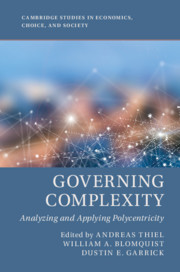Book contents
- Governing Complexity
- Cambridge Studies in Economics, Choice, and Society
- Governing Complexity
- Copyright page
- Contents
- Figures
- Tables
- Boxes
- Contributors
- Acknowledgements
- Introduction
- Part I Foundations for Understanding and Researching Polycentric Governance
- Part II Interactions and Performance in Polycentric Governance
- 5 Cooperation in Polycentric Governance Systems
- 6 Conflict and Conflict Resolution in Polycentric Governance Systems
- 7 Competition in Polycentric Governance Systems
- 8 Assessing Performance of Polycentric Governance System Interactions
- Part III Constituting Polycentric Governance
- Conclusions
- References
- Index
5 - Cooperation in Polycentric Governance Systems
from Part II - Interactions and Performance in Polycentric Governance
Published online by Cambridge University Press: 13 September 2019
- Governing Complexity
- Cambridge Studies in Economics, Choice, and Society
- Governing Complexity
- Copyright page
- Contents
- Figures
- Tables
- Boxes
- Contributors
- Acknowledgements
- Introduction
- Part I Foundations for Understanding and Researching Polycentric Governance
- Part II Interactions and Performance in Polycentric Governance
- 5 Cooperation in Polycentric Governance Systems
- 6 Conflict and Conflict Resolution in Polycentric Governance Systems
- 7 Competition in Polycentric Governance Systems
- 8 Assessing Performance of Polycentric Governance System Interactions
- Part III Constituting Polycentric Governance
- Conclusions
- References
- Index
Summary
Cooperation is an important way that decision centres interact in a polycentric governance system. Cooperation in governance has been studied by numerous scholars in the field of 'collaboration', although such scholarship seldom explicitly sets it within the framework of polycentricity. Cooperation involves multiple decision centres working across boundaries to pursue shared goals, and it is especially prevalent for addressing complex socio-ecological systems. This chapter examines cooperation in the Puget Sound basin, USA, for ecosystem restoration. This chapter describes how authority, information, and resources affected cooperation in formation of the Puget Sound Partnership and related Local Integrating Organizations, development of ecosystem recovery plans, and implementation of ecosystem recovery projects. It assesses polycentric governance performance in terms of outcomes and processes. The Puget Sound ecosystem restoration efforts exhibit relatively high levels of coherence, representation, and adaptability; relatively low levels of efficiency and accountability; and mixed results on efficacy and network building.
Keywords
Information
- Type
- Chapter
- Information
- Governing ComplexityAnalyzing and Applying Polycentricity, pp. 115 - 132Publisher: Cambridge University PressPrint publication year: 2019
Accessibility standard: Unknown
Why this information is here
This section outlines the accessibility features of this content - including support for screen readers, full keyboard navigation and high-contrast display options. This may not be relevant for you.Accessibility Information
- 3
- Cited by
